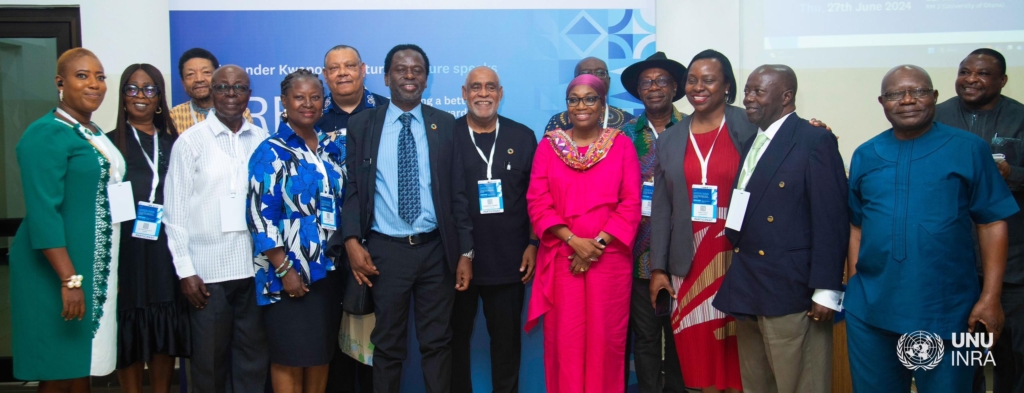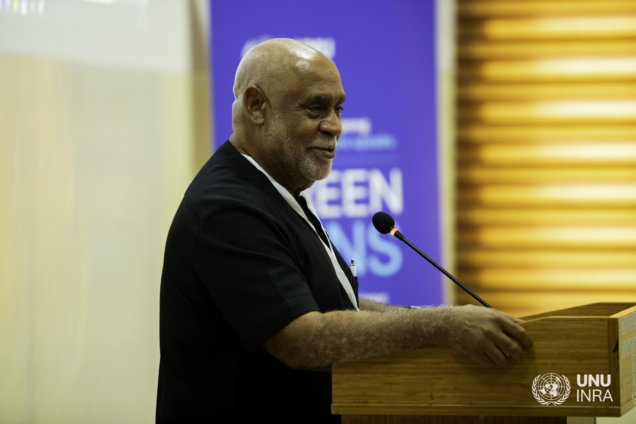Resident Coordinator of the United Nations in Ghana, Charles Abani is urging countries worldwide to leverage their unique comparative advantages in addressing the global climate crisis.
This call comes as a movement of environmental activists and other actors from across Africa, which emerged at the COP27 Climate Conference, continues to push for the largest polluters, particularly wealthy Western nations, to pay reparations for damages and losses to the continent.
They are also advocating for global climate change policies that prioritize the needs of indigenous people.
However, industrialized nations have yet to agree on a framework to create and implement an aid package for climate mitigation in developing nations.

During a lecture at the University of Ghana's Cedi Hall on the theme "Fostering a Better Dialogue Towards Sustainable, Inclusive Natural Resource Governance," Mr Abani emphasized that all countries face the same challenge and must bring their unique comparative advantages to the table.
The event was organised by the United Nations University – Institute for Natural Resources in Africa (UNU-INRA).
He noted that developing countries, while having lower emissions, are rich in natural resources needed for green transitions. In contrast, developed countries have the technology and resources to facilitate the transition but are burdened with the costs associated with high carbon-dependent models.
Both developed and developing countries will have to bear the costs. Historical emitters must retrofit and transition more, while those with higher impacts need to adapt more as well as grow greener”. Mr. Abani noted.
The UN Chief in Ghana premised his argument on the emerging trend where Finance challenges which most countries are challenged with while urging the world to adopt an investment mindset.
According to him “We must adopt win-win approaches and a different mindset to achieve breakthrough transformation. Sustainable interdependence and equitable approaches are essential. Developed countries need to move away from narrow interests, pursue equity-based models, and address responsible production and consumption”.
He further explained that developing countries must take responsibility, ensure policy congruence and leverage indigenous knowledge and technology, including Artificial intelligence.
With the deployment of the right capacities, Charles Abani is hopeful that there’ll be Sustainable and Inclusive Natural Resource Governance.
Latest Stories
-
Take politics out of anti-corruption institutions – Dr Oduro Osae
21 minutes -
President Mahama hails Black Star Marathon as key to Ghana’s tourism growth
39 minutes -
Ghanaian community in Côte d’Ivoire pushes for Chamber of Commerce to boost cross-border trade
1 hour -
The Joshua of Our Time: Why Dr Bryan Acheampong is the right leader to guide the NPP into its promised future
1 hour -
Public Financial Management Act must be enforced – Yaw Appiah Lartey on damning Auditor‑General’s findings
1 hour -
Absa Bank Ghana hosts Youth Festival to empower young entrepreneurs
1 hour -
WPRD Festival 2025 closes with PR fireside chat on leadership
1 hour -
Afrofuture and WatsUp TV launch nationwide Rising Star Challenge on university campuses
2 hours -
Auditor-General report: Heads must roll among technical officers, not just politicians – Dr. Eric Oduro Osae
2 hours -
Ghana must rethink internal audit to defeat corruption
2 hours -
CIMG engages BoG to deepen collaborations
2 hours -
Hey big spenders – Liverpool lead top-four domination of £1bn deals
2 hours -
UK-Ghana industrial ties celebrated as British High Commissioner visits Springs and Bolts factory
2 hours -
Discontinuation of UniBank case: Adongo calls for national discourse
2 hours -
uniBank case: The decision creates avenue to loot – Kwadwo Poku criticises AG’s move to drop Duffuor case
2 hours

